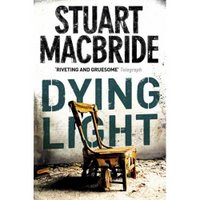
Harper Collins, 2006, ISBN , £10
Dying Light, MacBride's second novel, once again features Logan McRae and the lads and lasses of Grampian Police as they get themselves involved in a mess of cases. The streets of Aberdeen are littered with the bodies of prostitutes and someone's been lighting killer files across the city. Like MacBride's debut, Cold Granite, Dying Light features a twisting, labarynthe plot, brutal violence and some rather macabre humour. Its a style that works well for MacBride and its this occasionally cheeky, often macabre authorial voice that marks him out in the world of British police procedurals.
As in Cold Granite, the purported hero of the piece is DS Logan McRae, but this is procedural in the best sense of the word: the police in MacBride's universe work together as a unit with all the inherent strengths and weaknesses that entails. There's a feeling that Grampian Constabulary really does exist outside the confines of Logan's world, something that is often amiss in many procedurals who tend to focus so intently on how well our heroes do that its difficult to remember the teamwork aspect of a copper's life. MacBride's not quite creating a Scots version of McBain's 87th, but should he wish to do so, its easy to imagine it being a rather admirable project.
MacBride's strength lies in his easy going narrative which sweeps you through the twisting plot with a wink and a sly smile, knowing that the best kind of humour is of the gallows variety. There's a verve and enthusiasm that is infectious with his writing and while it is probably fair to say that MacBride isn't breaking new ground, there's no denying that he's having a fair bit of fun stomping around the procedural playground and its this enthusiasm that really stands out.
Its also nice to see him up the ante on the violence, with a finger-buffet providing a squeamish but not too sensationalist twist to the proceedings and some gory crime scenes for Logan and the Grampian Brigade to stomp across.
MacBride's vision of an Abderdeen underworld is beginning to take on a more coherent shape, too, and the novel is at its most effective dealing with the hookers who, for a variety of reasons, are forced to hang around some of Aberdeens darkest alleys and pray that they don't get picked up by some loony. That, in the midst of a crisis, these women are still forced - by circumstances often well beyond their control - to go out on the street just to survive leads to several of the more emotionally affecting scenes of the novel beyond the immediate concerns of Logan and his life.
What is particularly clever about Cold Granite is that MacBride manages to shake up Logan's world more than once. By placing him in situations - professionally and personally - where he feels uncomfortable or where there's an instant source of conflict for Logan, we are assured that this copper's lot is never going to be easy. The pressures on Logan come from several angles its to MacBride's credit that he lets each new source of conflict hit Logan in a different place - psychologically, personally, and maybe even a little physically, too.
With a dash of humour, an easy-going narrative, coppers who behave realistically (although almost always honourably) and a liberal helping of on-the-page violence, Dying Light is the perfect sequel: cementing the author's reputation and improving upon his debut. Mainstream procedural crime at its most readable, intelligent and, perhaps more importantly, entertaining.
Russel McLean for crime scene scotland, June 2006

